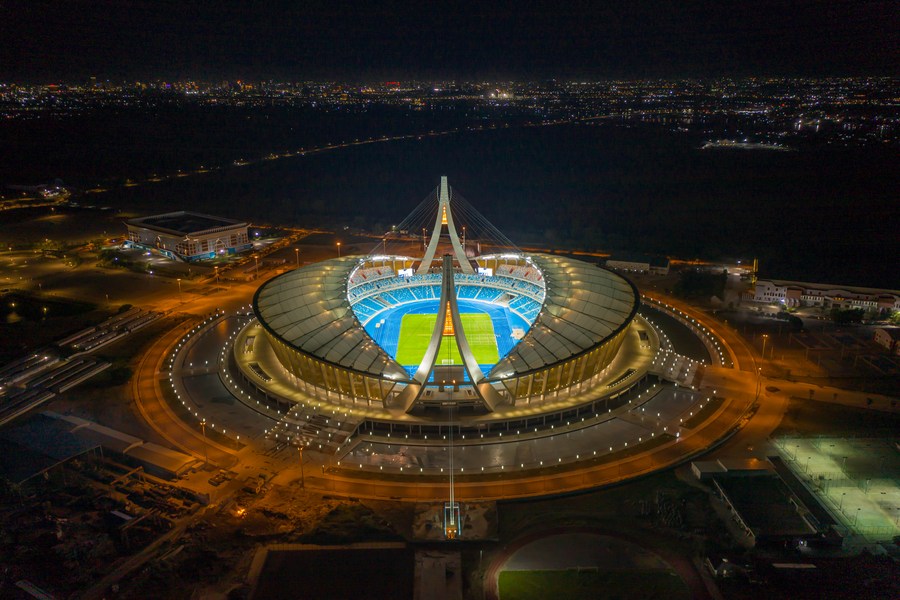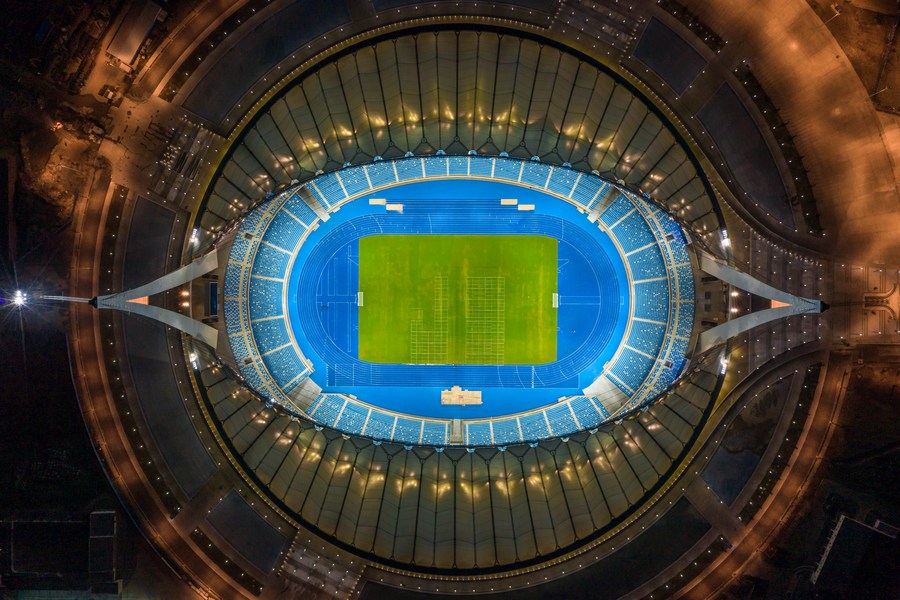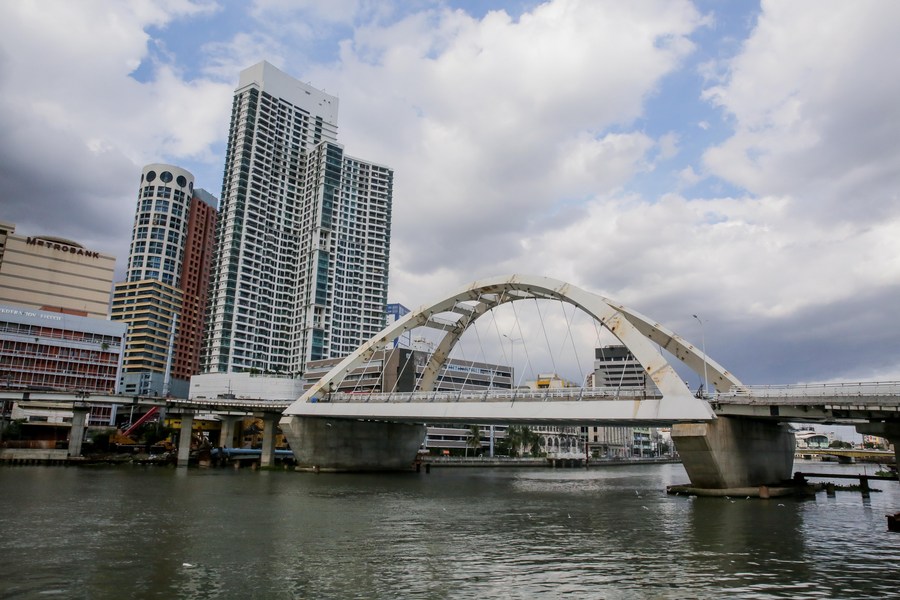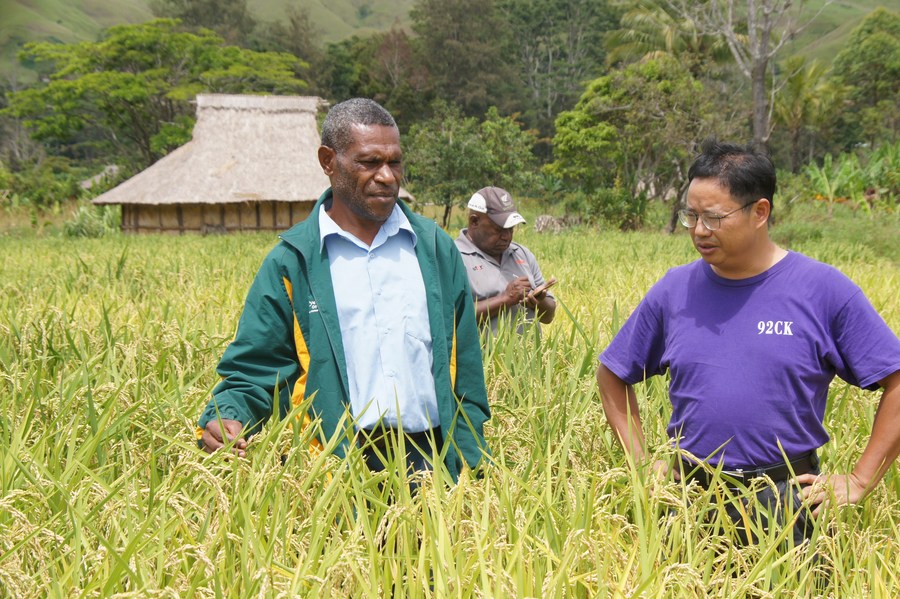"Reliable development partner" -- China in eyes of Asia-Pacific countries
* For a long time, China has always cherished every chance of cooperating with its neighbors in the Asia-Pacific region.
* Throughout the years, China has also helped some Pacific Island countries including Vanuatu, Tonga and Micronesia to build or renovate roads to facilitate their transportation. China's support was felt by ordinary people in the region.
* China has always stressed that cooperation between China and the Pacific island nations is conducted on the basis of respecting the countries and their people.
BEIJING, June 2 (Xinhua) -- As people in the Solomon Islands are looking forward to hosting the 2023 Pacific Games for the first time in history, China offers a helping hand to realize their aspiration.
Constructed with China's aid, an athletic track and a football pitch were handed over to the Solomon Islands in April. The quality rubber running track is the first of its kind in the Pacific island country.
At the handover ceremony, Solomon Islands Prime Minister Manasseh Sogavare hailed it as a milestone in the country's preparation for the Pacific Games. Calling China a "reliable development partner," he also thanked China for providing anti-pandemic supplies, rapid-test equipment and sending medical teams to his country.
In fact, the Solomon Islands is not the only country with which China has forged friendship in recent years on the basis of sincerity and mutual support. For a long time, China has always cherished every chance of cooperating with its neighbors in the Asia-Pacific region.

Aerial photo taken on Sept. 9, 2021 shows the China-funded Morodok Techo National Stadium in Phnom Penh, Cambodia. (Photo by Chen Gang/Xinhua)
FROM ROAD TO BRIDGE
Next year, another sports event will be hosted in a China-funded stadium as well: Cambodia has chosen the 60,000-seat Morodok Techo National Stadium in Phnom Penh as the centerpiece venue for the Southeast Asian Games first ever held in the country.
In the shape of a sailing ship, the 39.9-meter-tall stadium opened last year. Cambodian Tourism Minister Thong Khon, who is also president of the National Olympic Committee of Cambodia, said the stadium is a great achievement in Cambodia's sports sector and a new symbol of the unbreakable iron-clad friendship between Cambodia and China.

Aerial photo taken on Sept. 9, 2021 shows the China-funded Morodok Techo National Stadium in Phnom Penh, Cambodia. (Photo by Chen Gang/Xinhua)
"The sailing ship symbolizes a long-standing traditional friendship between Cambodia and China because Chinese people used to travel by sailing ships to Cambodia in ancient times," he said.
In March, the 134.8-km National Road No. 3 linking the Cambodian capital Phnom Penh and the southwestern coastal province of Kampot was inaugurated.
The road was built by the China Road and Bridge Corporation at a cost of about 215 million U.S. dollars, which in the eyes of Cambodian Prime Minister Samdech Techo Hun Sen is crucial to boosting economic and tourism development.
"Undoubtedly, this road will facilitate travel, transport of agricultural produce and other goods, and attract more tourists and investors to this coastal province," said Thun Sokleng, a 43-year-old farmer in Kampong Speu province, told Xinhua.
In April, a China-aided bridge that connects two busy districts in Manila City of the Philippines was unveiled.

The China-funded Binondo-Intramuros Bridge is under construction in Manila, the Philippines on March 3, 2022. (Xinhua/Rouelle Umali)
With a total length of 680 meters, the Binondo-Intramuros Bridge is one of the two China-aided bridges constructed under the Philippine "Build, Build, Build" program in spite of the COVID-19 pandemic.
The new bridge can cater to 30,000 motorists daily. It is expected to become another landmark of the city.
"I thanked, and with gratitude, the People's Republic of China for the confidence and for being a partner in enhancing key infrastructure projects in our country," former Philippine President Rodrigo Duterte said at the unveiling ceremony.
JUNCAO, VACCINE, MUTUAL RESPECT AND DEVELOPMENT
Throughout the years, China has also helped some Pacific Island countries including Vanuatu, Tonga and Micronesia to build or renovate roads to facilitate their transportation.
China's support was felt by ordinary people in the region.
Kila Vali was a farmer from the central area of Papua New Guinea (PNG). For him, China, though more than 6,000 km away, was not unfamiliar.
"China has helped us a lot. Look at the schools here, the road before the parliament," he said. "They help teach us how to plant rice. This is important for people here who live by planting to sustain their lives."
As a Chinese proverb goes, "Give a man a fish and you feed him for a day; teach a man to fish and you feed him for a lifetime."
With the help of agricultural specialists from East China's Fujian province, many PNG farmers are growing rice and mushrooms out of the special wild grass, similar to some fungi grown from organic matter. The grass Juncao, also called "China Grass" by natives, can also be used to feed livestock.

Lin Yingxing (R), specialist from the Fujian Agriculture and Forestry University, checks the growth of the dry-land rice with local specialist Tony Simon in the Eastern Highlands Province of Papua New Guinea on Jan. 30, 2020. (Photo by Hu Yingping/Xinhua)
The pilot Juncao project was launched in 2000 in a bid to improve the livelihood of PNG people. In 2018, during the visit of Chinese President Xi Jinping to the Oceanian country, China and PNG signed another aid project using the grass technology. By 2023, the aid program is expected to lift 30,000 local people out of poverty.
According to the Chinese Ministry of Foreign Affairs, for the Pacific island countries, China has so far implemented more than 100 aid projects, delivered more than 200 batches of in-kind assistance, and trained about 10,000 talents in various fields. It has dispatched 600 medical staff to those countries, benefiting more than 260,000 local residents.
After the outbreak of COVID-19 pandemic, China offered support to the Pacific island countries. So far it has provided about 590,000 doses of COVID-19 vaccine and more than 100 tons of supplies to the Pacific island countries.
China has always stressed that cooperation between China and the Pacific island nations is conducted on the basis of respecting the countries and their people.
On Monday, China released a 15-point Position Paper on Mutual Respect and Common Development with Pacific Island Countries, including jointly promoting regional peace and security and cracking down on transnational crimes, such as cyber crimes, and tackling COVID-19 and strengthening people-to-people exchange.
The paper underlined the equality of all countries, regardless of their size, strength and wealth, advocating for peace, development, equity, justice, democracy and freedom. It also emphasized the respect for independence, sovereignty and territorial integrity of Pacific island countries, the support for these countries in independently choosing development paths suited to their national conditions and the adherence to non-interference in internal affairs of the countries.
Luke Mani, director of the Solomon Islands Foreign Policy Advisory Secretariat, noted that in the Pacific island countries, people benefitted from hospitals, roads, wharves, schools, airports, sports facilities built by China. "For instance, in Solomon Islands, China-donated-and-built infrastructures are at levels never before seen," he said.
He said that the United States and their allies "saw nothing else but naval bases and military installations."
"This obsession with strategic interests is nauseating to many Pacific island nations," said Mani. "The Pacific islands are tired of being a strategic anecdote to anyone."
"Seeing is believing," he continued. "Local people, regardless of the attempts at misinformation and anti-China propaganda, are now believing in China as a reliable friend!" (Video reporters: Bai Xu, Guo Lei, Hao Yalin, Bai Xuefei, Yue Dongxing; Video editors: Ma Ruxuan, Zhang Yuhong)

